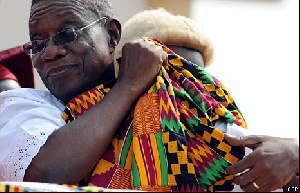A group of Ghanaians calling itself The Concerned Citizens Association of UK have filed a petition against President Mills at No 10 Downing Street during the President's official visit. The petition, a copy of which has been posted under e-petition on the 10 Downing Street website expresses concern that President Mills' government is supervising over a spate of human rights abuses in Ghana.
The President who is visiting the UK officially this week has been confronted with this petition as a way of highlighting the concerns of a number of Ghanaians in the UK. The petition reads:
“We as Ghanaians have watched with utter dismay and disbelief the spate of human rights abuses and lawlessness being unleashed on law-abiding Ghanaians by cadres, militants an activist with the connivance of the government led by President Atta Mills.
“The President is presiding over a country in which state-sponsored gangsterism, criminality, lawlessness, and politically motivated ethnocentrism are on the rise. A section of Ghanaians have become refugees in their own country because some government activists have openly declared warfare against their political opponents in many communities in what appears to be a politics of vendetta. A section of people in the Northern Region of Ghana who belong to the government’s Party have been allowed to carry weapons for the purpose of this politics of vendetta and retribution and the government has been very lame in its efforts to call them to disarm. we want Mr. Brown receive assurances from the President that he will address these spate of human rights abuses, political and ethnic tension and promote true democracy in Ghana." According to the Concerned Citizens, led by Mr. Paul Ahwireng, as Ghanaians settled in UK, they are also bemused by the apparent “lack of leadership being exhibited by President Mills a good 100 days and over into his leadership as he has sat back totally unconcerned or conveniently oblivious to the high spate of human right abuses going on in our country”.
As Ghanaians living and working in the diaspora, the Group continued: “We owe it a duty to Ghanaians to speak out before a negative human rights image is created about our dear nation Ghana which will undoubtedly cast a slur on our democracy, national unity and our hard fought international image of being a shinning example of an African country of good governance”.
Across the country, according to the group, there is a sense of despondency among a large section of the population as the NDC party activists are creating a sense of return to military style revolution. The party activists are taking over offices, public buildings, places of convenience and public amenities with the simple reason that “our government is in power”. They refused to accept government appointees and in a sense have created a state of emergency. A section of the public and private media has been described by the government as “enemy media” and excluded from official government briefings.
The sum effect of these acts of lawlessness and the seeming inaction of the government of Ghana led by HE JEA Mills is that investors are beginning to leave the country in droves at time of economic downturn when we as a country need more investment. The economy is deteriorating at an unprecedented rate. Inflation is now at 20.53%, a rise of 2.53% since January this year. The Cedi, our local currency has depreciated against the US Dollar at a rate of 60% in three months. Interest rate has risen by 4% from 25% to 29% at a time when the rate should go down. Ghana’s economy is hurting because the government’s actions or inactions are sapping confidence away from people.
Asked what the Group wanted to achieve, Mr. Ahwireng said as law abiding residents in the UK, they did not want to embarrass the UK government by going on demonstration against Prof. Mills but they wanted to highlight what they felt about the state of the nation of Ghana since the NDC took over power in January 2009. The President, he mentioned, incidentally seems incapable to take decisive actions to assure the nation of its political stability. “We are deeply concerned. The civil society feels deeply at risk. Our democracy is at profound risk”, he concluded.
Diaspora News of Thursday, 7 May 2009
Source: Harry Johnson Aggrey

















